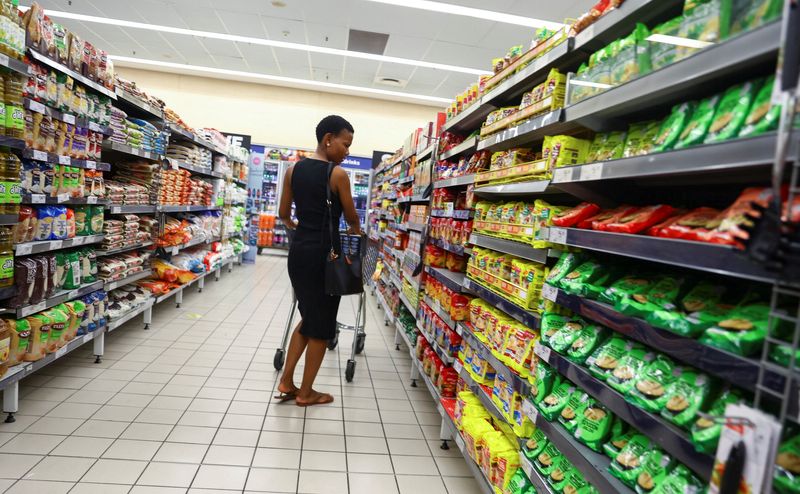
© Reuters. FILE PHOTO: A customer compares prices while shopping at a Pick and Pay shop in East London, in the Eastern Cape province, South Africa, March 17, 2023. REUTERS/Siphiwe Sibeko/File Photo
By Vuyani Ndaba
JOHANNESBURG (Reuters) – South Africa’s economic growth is expected to pick up slightly next year due to better energy supply, a Reuters poll found, while slowing inflation might give consumers some respite although the bigger risk is it remains elevated.
Gross domestic product (GDP) is expected to expand 1.2% next year, better than a 1.1% expectation in a September poll and compared to a median estimate of 0.7% for this year. In 2025 it is forecast to grow 1.7%.
“We expect growth to stage a mild improvement into next year on the back on an improvement in the supply of energy. This should have positive ramifications for confidence in the household and business sectors,” said Sanisha Packirisamy, economist at Momentum Investments.
“Moreover, real wages are expected to improve as inflation continues to shift towards the midpoint of the target band on a more sustainable basis, providing a lift in purchasing power for households.”
Inflation in South Africa is expected to brake to 4.8% next year, slightly slower than predicted in last month’s poll, and compared with 5.8% estimated for this year.
In 2025 inflation is forecast to slow to 4.5% – in the middle of the South African Reserve Bank’s 3%-6% comfort range.
Still, all 10 economists who responded to an additional question said risks to the inflation outlook were skewed more to it being higher over the coming year, with some wary of currency weakness and government-set prices.
Economists expect the South African Reserve Bank to wait until either January or March before cutting its repo rate by 25 basis points to 8.00%.
Rates are then expected to be cut by the same amount in May, the only policy meeting in the second quarter, and then again either in July or September to 7.50% before a brief pause into 2025. The repo rate is forecast to end 2025 at 7.00%.
The SARB’s negative real rates turned positive at the end of last year and look to remain so for the rest of the horizon.
Still, the head of South Africa’s central bank said on Wednesday the government needed to rebuild its fiscal buffers to help bring down inflation, and he expected domestic interest rates to stay higher for longer.
In the world’s biggest economy, the United States, the latest Federal Reserve minutes showed policymakers wrestling with risks they agreed were no longer just about inflation.
(For other stories from the Reuters global economic poll:)
Source: Investing.com





























